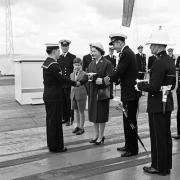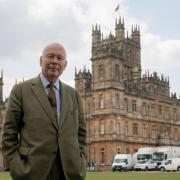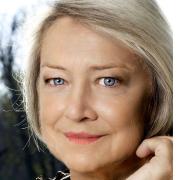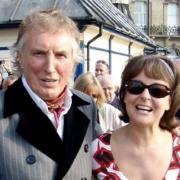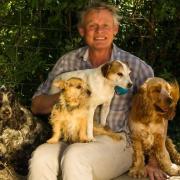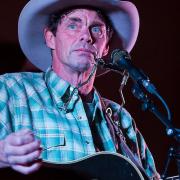As the son of Jocasta Innes, Jason Goodwin had a peripatetic childhood. Now an award-winning author living in Dorset, he has assumed his mother’s nonconformist mantle
With his mop of hair, owlish spectacles and tatty brown jumper, Jason Goodwin could be nothing but a bestselling author. Wildly successful but eclectic, he was named Young Writer of the Year in his 20s for a precocious essay on Polish politics.
His second travel book On Foot to the Golden Horn (he walked to Istanbul, as you do) won the John Llewellyn Rhys Prize and his first crime novel The Janissary Tree – featuring Yashim, a 19th Century eunuch detective – earned him America’s prestigious Edgar Award, immediately ranking him alongside the likes of John Le Carre, P D James and Raymond Chandler. And the Independent on Sunday, described him as “intimidatingly clever”.
But Jason – now four novels on - wears such badges lightly. He doesn’t even get cross when I describe him – all those eunuchs, strumpets and derring-do - as a thinking man’s Wilbur Smith.
“Eventually, you’ve got to pick up one of these awards, haven’t you?” he says modestly. “The Edgar was cool. They wanted to give me the prize for best first novel but they could only award that to an American so they promoted me.”
Even if he weren’t so horribly likeable, I’d have taken to this fresh-faced 50-year-old: I owe him and his family. If it weren’t for his mother – the maverick cookery writer and interior designer Jocasta Innes – and his wife, Kate Harris, I’d have starved long ago.
Jocasta’s peerless, back-in-print 1970 book, The Pauper’s Cookbook, was later updated by Kate and her dazzling recipe for spaghetti all’arrabbiata has been saving me from Pot Noodle for the last 22 years.
“When mum wrote the original,” says Jason, “she was living on a shoestring in a bedsit in Swanage with her new bloke, so she was very much writing from experience.
“But 20-odd years later, Kate and I were the young paupers. And one of the things lacking in the first book was pasta – it just wasn’t on my mum’s radar in 1970. So Kate added all that in.”
His background is arguably as outlandish as his fictional creation, the oddly lusty, accidental castrati (a crushing earthquake) turned Ottoman sleuth and amateur cook.
As Jason says, only half-joking: “I could only have become a novelist.”
After his parents - Jocasta and the film producer Richard Goodwin - split up when he was three, he and his then five-year-old sister Daisy – now a novelist too, naturally – shuttled back and forth between their paternal grandmother’s house in the New Forest and the Swanage bedsit their mother shared with Joe Potts, a penniless Geordie novelist, and their own two daughters.
In a withering 2007 memoir, Daisy wrote: “Going from one home to the other every weekend and half the holidays was like going from East to West Berlin during the Cold War.”
Jason recalls: “We’d go to Wareham by train, then take the bus. My mum didn’t own a car or even a bicycle. I slept on this awful flap-down chair with my feet on the sofa along with the dog. There was a room next door where the girls slept. Downstairs, there was a bathroom and sitting room. My mum and Joe slept there. It was fairly squalid.”
Joe, six years Jocasta’s junior, was – at best – unsuccessful, and mean with it.
“He was a frightening man - bullying and threatening. I wasn’t keen on going down to see him but I loved seeing my mum. Daisy’s memoir was quite upsetting, it gave my mum quite a turn. I would like to write about them all but I’ll wait until they’re all dead.
“Of course, Mummy could have been a much more straightforward, conventional mother but then what? Then everything would have been different. We’re all like caged animals in a zoo – we don’t know what we’re missing.
“And it wasn’t all dreadful. Children like a really ordered, careful life. For two or three years, we lived with Richard’s mum while he was in London making movies. That was an idyll: blue tits would take the cream off the milk every morning.
“But Swanage was a maelstrom of adventures and shouting and cooking and drinking – a lot of scrumpy. Joe and Jocasta were always having these great theatrical arguments about whether DH Lawrence was better than John Cowper Powys.
“It was ghastly, really, and it left a mark. It could never last. Mum finally ran away from Joe when I was about 14.”
Ever the trend-setter, Jocasta – monied now - fled back to London to set up home in a briefly derelict Spitalfields brewery (now worth £2.5million) with Sir Richard MacCormac, an architect.
Jason adds: “Joe was dangerous, simmering with resentment and brutal to us as children.
“He was a terrible goader, which is not a very nice thing to be with children. What’s the point of an adult teasing a child to the point of tears?”
If Joe, who died, aged 70, two years ago, of a heart attack on the couch of a Blandford acupuncturist while being treated for fallen arches (how else would a novelist’s wicked stepfather die?) was a monster, Jason’s father Richard, now 79, was more of a saint.
A hugely accomplished film maker, he was responsible for Death on the Nile and Murder on the Orient Express. When Jocasta left him, he was granted custody – almost unheard of back then – of the two children. As Jason says: “He has been a terrific dad, so hats off to him.”
But more surprises lay in store. Aged 28, Jason was at a drinks party in London when a stranger approached him and said: “Oh, you’re John Michell’s son.”
Jason explains: “Ma and John were lovers at Cambridge. Then – as it turned out - they sort of picked up again just before I was born. But John wasn’t the marrying kind. He did, oddly enough, get married just before he died, to a druidess from Glastonbury. That was very John.”
If there is a more tangled family history, I have yet to hear it.
“I didn’t talk to my mum but rang John up before going to meet him. I ended up very fond of him. But thank God he didn’t stick around when I was born. Fatherhood is a job and John would have been hopeless. He was a New Age hippy – he would have been forever off dropping acid on Dartmoor.
“That’s what I said to Richard. Anyone can be a become a father, actually being one is a different thing. You have to earn the position.”
Did Richard – who Jason firmly calls “dad”- know?
“He says he never did – he’s a very good man - but I’m not sure I believe him. I waited until I was 40 before asking him. He’s not a man who wants to talk about stuff much. By common consent, we decided we’d never talk about it again. And we haven’t.”
But there was, it seems, resolution for them all. John, 76, moved in with Jason five years ago, just before his death.
“He’d lived in Notting Hill all his life but he came down here to die in our house. There was no one else. And we loved him. He was a very charismatic, interesting guy.
“He’d come in, sit quietly, and within an hour, you’d discover everyone in the room was sitting round him, listening. He was magnetic.”
Richard – now 79 - went on to marry a German costumier, ten years his junior. They live together still in a vast Thameside warehouse in Rotherhithe.
“Christina’s incredibly strong-willed. She wears nothing but V-neck blue sweaters and blue cords, and works 18 hours a day. She and Daisy didn’t really get on. My sister saw her as a usurper. But Christina did make us a home.”
Joe got his come-uppance and Jocasta ultimately found happiness back in London with 75-year-old Sir Richard, before dying last year, succumbing to pancreatic cancer.
Jason has four children with Kate – a wild-haired academic he met at Cambridge. They age from 11 to 20 and are clearly as dauntingly clever as their parents. I quickly lose track of who’s going to Oxford, who’s going to Cambridge.
Their magnificently dishevelled manor house, tucked away behind Burton Bradstock, shrieks of shambolic and happy family life.
Books and prints and cheques and musical instruments – a sax, a guitar - dot every inch of table, floor and wall. The rambling kitchen is a posh version of Withnail & I’s. Jason has to go digging in the overflowing butler’s sink for clean coffee mugs.
But I’ve seldom envied a man more. He and his family moved from Sussex to Dorset eight years ago: “There was always this odd, Dorset pull.”
Best of all, he is utterly without rancour.
“You just do your own thing, you can’t always refer your situation in life back to your parents. Yes, my mother had a wild youth but she always had a tenor for doing things at the right time. In the 60s, she embraced the Swinging Sixties, a film-making husband and all that. As the 70s dawned, she was living in Dorset, making nettle soup and soaking beans. Then, as an 80s icon, she moved back to London to teach people how to put colour in their lives.
“Finally, she decided she wanted to be more settled and live in a nice house in a nice part of town. Once she spent time with Richard MacCormac, she realised that stability was something she wanted, after all. She was tired of living pillar to post.”
Jocasta died, aged 78, at home, surrounded by her children. The end, when it came, was blessedly quick.
“One minute, she was saying ‘I feel a bit funny’. Then, she crashed and six weeks later, it was over. We brought her home from hospital – there was nothing else they could do – and put her in bed in the sitting room downstairs as she faded away to skin and bone.
“But she was incredibly brave, fantastically cool. She just said: ‘Well, it’s fate’. Then she just got on with it. We had one final moment. She told me ‘It’s all about beauty, beauty is truth’. I think she was actually thinking of her own mother’s funeral, which was grim – pouring with rain, dark coats. She wanted her death to be something lovely.
“Beauty mattered to her. Why waste your time with things that are ugly, a room that’s depressing or food that’s crap? She never wanted to sit around and mope.
“I squeezed her tiny, sparrow-like hand and, that night, I slept on the sofa, thinking she’d be dead in the morning. But she opened her eyes and said ‘Darling, I’d like a glass of water’.
“That was Friday morning and, on Saturday night, she died.”
Standing in the garden, Jason says: “Mum always loved Dorset, and it is amazing here. On a still night you can hear the pebbles growling on Chesil Beach. There is, I think, plenty of material for future books.”
And with that he cheerily waves me goodbye and retreats to his glorious, book-lined summerhouse.






